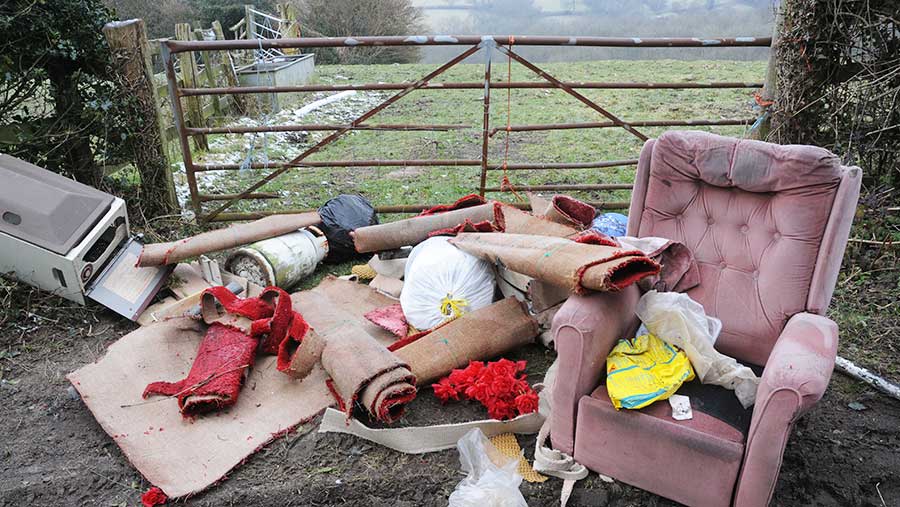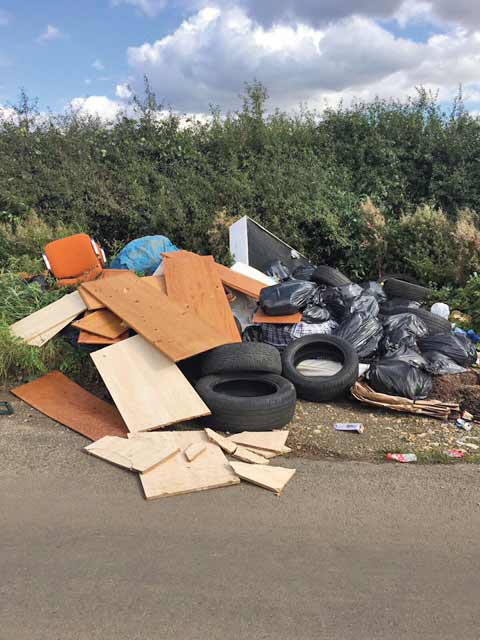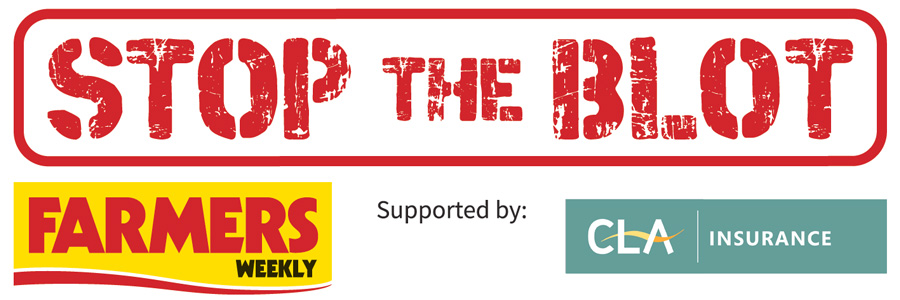Defra snubs landowners’ plea to change fly-tipping laws
 © John Curtis/REX/Shutterstock
© John Curtis/REX/Shutterstock A landowners’ lobby group has hit out after Defra dismissed calls to allow landowners to remove fly-tipped waste from their land free of charge.
Under current legislation, it is the responsibility of the landowner to remove waste dumped on private land and dispose of it legally.
The Country, Land and Business Association (CLA) says the law unfairly penalises landowners, who have to cope with the time, cost and stress of removing someone else’s waste.
See also: Revealed – the burden of fly-tipping on farms
In some cases, local authorities have threatened innocent landowners with prosecution if they fail to clear the rubbish.
However, if fly-tipped waste is dumped on public land or highways, the responsibility lies with the council to remove it.
CLA president Tim Breitmeyer wrote to Defra in November, urging the department to take more action to tackle the growing epidemic of fly-tipping on farms.
In his letter, Mr Breitmeyer outlined his organisation’s five-point plan to tackle fly-tipping (below) and he highlighted Farmers Weekly’s Stop the Blot campaign, which found that almost two-thirds of farmers have been victims of fly-tipping.
CLA five-point plan to tackle fly-tipping
- Impose penalties to better reflect seriousness of crime
- Fine home and business owners whose fly-tipped waste is found
- Develop new ways to clear up and support victims
- Promote education and working in partnership
- Appoint a national “fly-tipping tsar”
Mr Breitmeyer told environment minister Therese Coffey that “it cannot be right that landowners as the victims of a crime then become criminals themselves”.
Free disposal trials
He said some local authorities have trialled allowing free disposal of fly-tipped waste at their local waste recycling centres, but the initiative “is yet to become standard practice”.
Ensuring that free disposal of fly-tipped waste is available across the country would help encourage better reporting of fly-tipping on private land, the CLA said. It would also help build a more accurate picture of where fly-tipping occurs, allowing the police to target known hotspots.
But responding to the CLA in a letter, Ms Coffey said she saw no reason to change the legislation.
“Landowners are currently responsible for dealing with waste that is dumped on their land and enabling fly-tipped waste to be disposed of free of charge would not provide the right incentive to secure land against fly-tipping,” she wrote.
Defra believes that placing an obligation on local authorities to remove illegal waste from private land would encourage illegal dumping rather than tackle the problem.
Legal responsibility of private landowners
Landowners are responsible for clearing and disposing of any fly-tipped waste found on private land. Local councils will not normally clear rubbish dumped on private land free of charge, but they may investigate such incidents and where appropriate take enforcement action.
Source: National Fly-tipping Prevention Group
Cost recovery
Ms Coffey said Defra expected all local authorities to investigate fly-tipping incidents on private land. Councils should work with landowners to prosecute the fly-tipper and recover costs, she added.
Mr Breitmeyer told Farmers Weekly the CLA was encouraged that Ms Coffey had acknowledged the CLA’s action plan and had stated Defra intends to take forward most of the points raised.
But he added: “We are disappointed that no effort has been made to look at how landowner liability could be reduced.
“There are alternatives the government and local authorities could explore to ease the burden of disposal costs for landowners. It is a cop-out not to look more closely at how to change the unfairness of this rule.”
Case study: William Ashley, Monks Green Farm, Hertfordshire

Waste fly-tipped on William Ashley’s farm
A mixed farmer from Hertfordshire says landowners should not have to pay the bill to clear somebody else’s fly-tipped mess.
Sheep farmer and forage producer William Ashley said Monks Green Farm has been targeted by fly-tippers six times in the past 12 months.
On the last occasion, on 8 November, Mr Ashley arrived home after a day at the Farm Business Show in Birmingham to find a pile of old mattresses, wood, tyres, cardboard, plasterboard and other items dumped next to his land.
“The rubbish was dumped on a grass verge that backs on to my land. Thankfully, the council cleared it this time, but I have previously had to pick up the bill, which cost thousands of pounds,” said Mr Ashley.
“I’m disappointed Defra has decided not to pilot a scheme to allow farmers to remove fly-tipped waste free of charge. Why should farmers be made to pay to clear someone else’s rubbish?”
Mr Ashley, who farms 100ha in Hertford, including hay production for Newmarket stables, blamed the increase in fly-tipping on councils charging at waste recycling centres to accept some materials.
“If they didn’t charge for it, or made it easier for people to dispose of household DIY waste, fly-tipping cases would fall.”
Stop the Blot
Fly-tippers are ruining our countryside and clean-up costs are crippling farm businesses. That’s why we have launched our Stop the Blot campaign to help raise awareness of the damage caused by fly-tipping and tackle the growing epidemic on farms.

